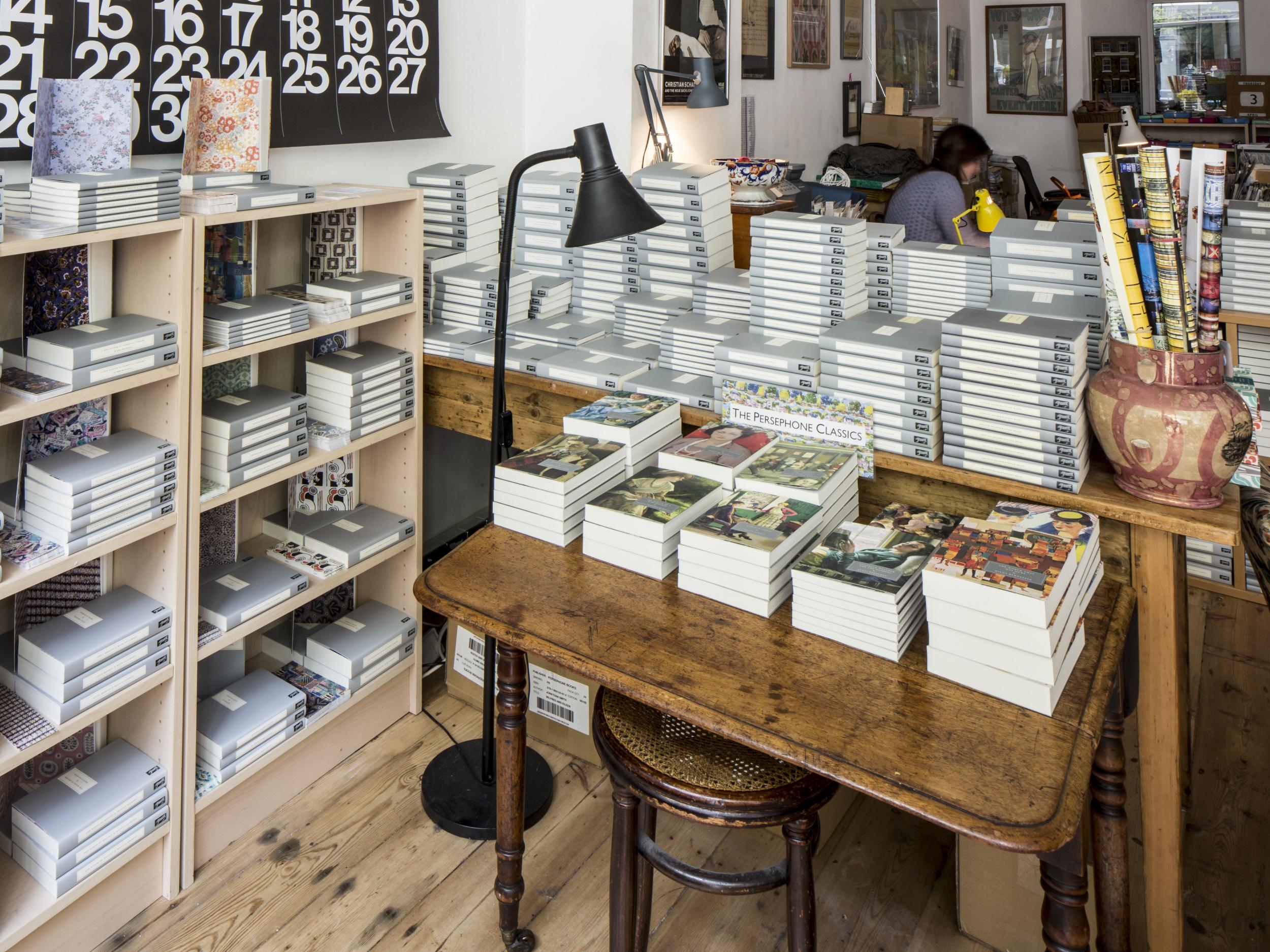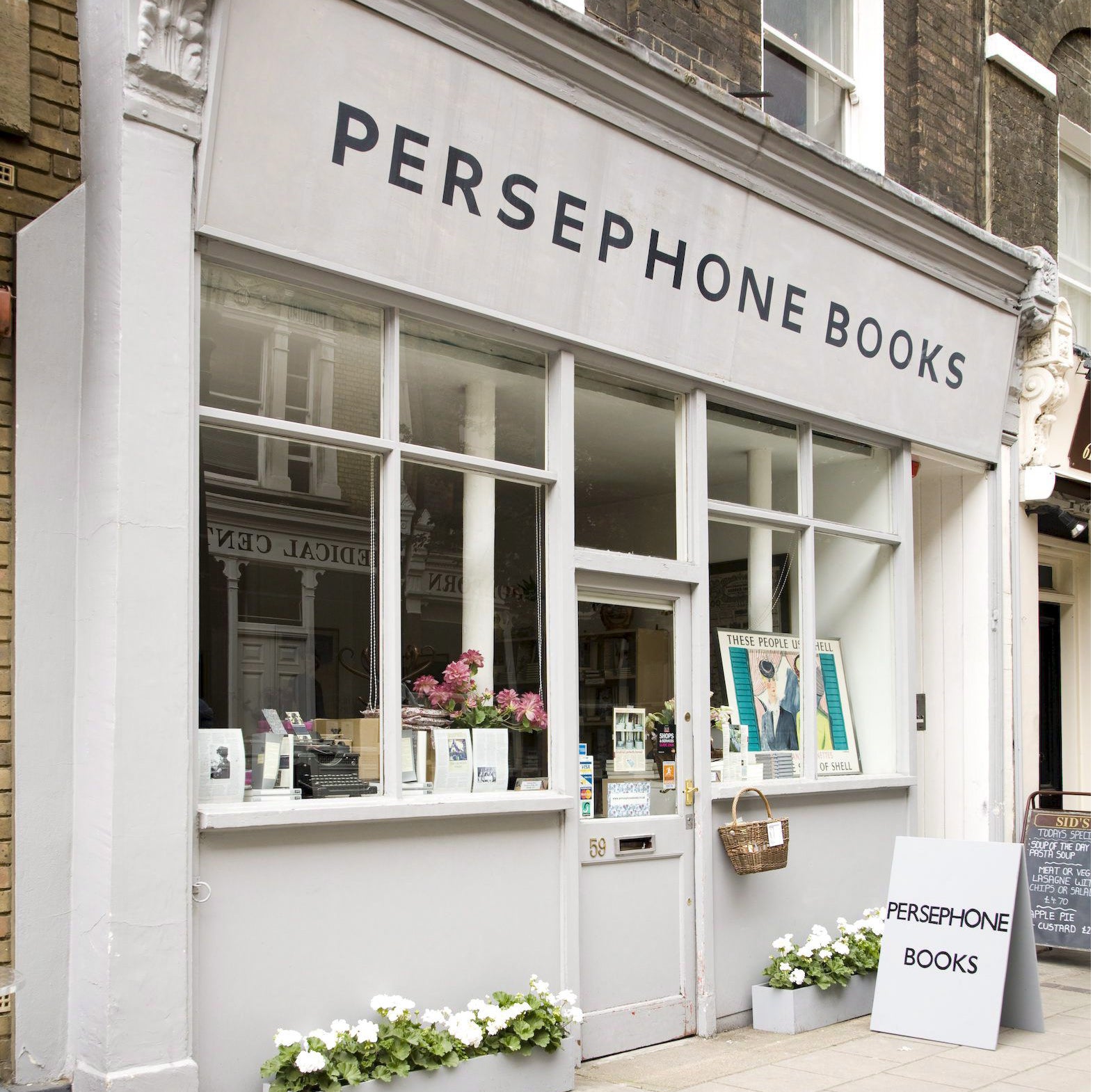Why Persephone Books is celebrating overlooked women writers
Persephone Books reprints neglected works by women writers of the mid-20th century. Sarah Lyall tells us what makes these books so special

Lamb’s Conduit Street seems almost too adorable to be real, as if Ye Olde Fantasy Englande, the one that exists in your head, had suddenly sprung to life. But it feels exactly right that this cobblestone thoroughfare in Bloomsbury, filled as it is with idiosyncratic shops selling artisanal cheese and homemade cakes and other rarefied items, should also be home to Persephone Books, a gem of a place devoted mostly to overlooked works by female writers of the mid-20th century.
Walking into the shop feels for a moment like walking back in time. Vintage posters exhort wartime women to, for instance, Join the Wrens, the British women’s naval service. But the present is here, too. In the window is a blowup of Sen Mitch McConnell’s ill-tempered remarks about Sen Elizabeth Warren in 2017, using language that sounds decidedly Jane Eyre-ish: “She was warned. She was given an explanation. Nevertheless, she persisted.”
Persistence is one way to describe the philosophy of the shop itself, which began 20 years ago as a mail-order publishing business reprinting forgotten titles from an era in women’s fiction beloved by its founder, Nicola Beauman. Having come into a small inheritance from her father, she opened the business with a list of 12 books that first year.
Here you will find books by women you have probably never heard of, like Oriel Malet and Isobel English, and some who might be more familiar, like Katherine Mansfield and Frances Hodgson Burnett. (There are even a few men on the shelves.)
You’ll also find, in pride of place, Miss Pettigrew Lives for a Day, a 1938 novel by Winifred Watson that was brought to Persephone’s attention by a customer who said it had been her mother’s favourite book. Published by Persephone in 2000, the book – about a poor, drab governess mistakenly sent by her employment agency to work for a glamorous nightclub singer – became an unexpected hit for the company, was made into a movie and has been a consistently buoyant seller ever since.
What makes a Persephone book?
“I’m pretty allergic to the egocentric idea that it’s all down to my taste, but I have to confess that I have always had this huge interest in early 20th-century fiction by women – what academics would call middlebrow, and I would call a good read,” Beauman says.
“The connection between them is that they were forgotten and they’re very well written,” she continued. “I’m very keen on story and on page-turners. When I get to the end of a book, I like to put it down and feel absolutely wrenched by what I’ve read, to be in a different world.”
Each year perhaps a half-dozen more books join the list, so that there are now 132 in all. All are still in print, and all are still for sale, each for a flat £13; every time the new titles arrive, the old books are moved a bit and the shelves reorganised to make way.
After a few seasons as just a publisher, Persephone became a bookstore, too, leaving its old office in Clerkenwell and expanding into its current space. It is both office and shop, one purpose blending into the other across two rooms.
Overall, the shop’s most popular author is a woman named Dorothy Whipple, who has an impressive 10 books on the list, Persephones No. 3, 19, 40, 56, 74, 85, 95, 110, 118 and 127. Her books are funny and spirited and full of insight about real people’s lives.
“I like books that tell me how we lived,” Beauman says. “I’m very, very interested in the novel as social history.” Also, she adds: “Good writing is important to me, and that’s why we only have 132 books.”
The books are austerely elegant, bound in light-grey paper and unadorned except for the title in a white rectangle on the cover. Beauman was inspired by the plain covers of 1930s Penguin books and the French custom of publishing books with white covers and red writing, she says, while the colours are something of an homage to old Dean & Deluca coffee mugs.

“I thought, ‘Why can’t a book look like this?’” she says.
Or, as it says on the company website: “Persephone books are all grey because, well, we really like grey. We also had a vision of a woman who comes home tired from work, and there is a book waiting for her, and it doesn’t matter what it looks like because she knows she will enjoy it.”
Inside, though, the books are riots of colour. Each book has a different endpaper taken from textiles or prints associated with the year in which it was originally published. Some come from the Victoria & Albert museum; others might be fabrics contributed by customers. “Once somebody brought in a wartime scarf, and you could literally smell their mother’s powder on it,” Beauman says.
Persephone has a devoted and passionate following. Some 30,000 people subscribe to its free magazine, the Persephone Biannually, which includes articles about the newest books and other subjects. Its website contains Beauman’s own wittily erudite musings, which lately have taken an alarmed tone because of uncertainty over the fate of small businesses during the protracted debacle that is Brexit, or Britain’s exit from the European Union.
Last month, the company celebrated its 20th anniversary with smoked-salmon sandwiches, tea, Champagne and cake in an all-day party with a steady stream of visitors giving way to a larger crowd at night.
“The idea at the beginning was that if you like one of our books, you’ll like them all,” Beauman says. “That has worked almost entirely. It’s quite rare for someone to dislike any of the books. I hate to use the word ‘brand,’ but we are something of a brand.”
© New York Times
Join our commenting forum
Join thought-provoking conversations, follow other Independent readers and see their replies
0Comments